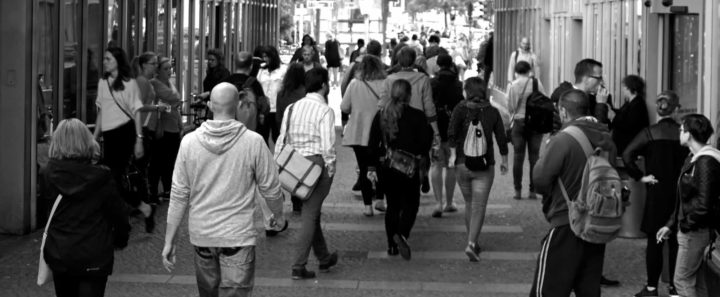We all recognize admirable qualities in others when we see them. We naturally know what it feels like when there is something we admire in others and would love to copy for ourselves as well. But then I wondered: why wouldn’t we then do more of these things ourselves, especially after we have seen their effects so clearly manifested in people we admire? Wouldn’t we want to become our own “admirable hero” sooner or later as well?
But what do we even mean by a hero, and what does it imply? To rule and to dominate? To win and feel superior to others? To successfully set yourself apart from all the losers who surround you? Or are we talking about someone who takes on the responsibility (and also the burden that comes with it), leads by example, and cultivates these noble and admirable qualities himself?
And on the contrary, what does it mean to be a loser? To be useless and of no service to others? Incapable and unskilled? Unlucky, unfortunate, and beaten to the ground? Or do we base our definition of a loser on the even better question of “compared to whom?” It could be that a loser comes closer to a person who rests upon unmanifested potential. A person who prefers to dwell in the “meaninglessness and nihilism of the world” instead of stepping out into the chaos and do his part of making it a tiny bit more just and right. Whatever “just and right” even means. Or whatever it could mean to him.
So if a loser is someone who doesn’t take ownership over his actions, and instead curses the skies for the meaningless this cruel world brings with it, then the ultimate question arises: Why isn’t everyone then naturally driven to cultivate these admirable qualities in himself and eventually rise to the ranks of heroes as well? Why would anyone want to remain a nihilistic loser instead?
But the obvious counterargument has equal strength and motivation too: Why would anyone want to get out into this meaningless and cruel world and then adopt the individual responsibility of trying to make it better? Why would any sane person expose themselves to the evil and chaos of the world, if there is also nothing but struggle and hardship lying ahead of them?
Instead, everybody always wants more rights. They feel they are privileged to get more, without ever thinking about the other side of the equation, which is responsibility. We cannot have a talk about rights without also thinking about the fact that someone else has to take on the responsibility to provide them. And then we might wonder why these “admirable heroes” should even carry this heavy burden for us? It seems that most people demand that somebody else has to take on the responsibility to provide them their fictional and entitled rights. Anyone, but themselves.
But what if we would adopt a different mindset and furthermore step forward to lift the heavy burden ourselves? What if we would take on the duty to provide these rights for others on our own? Wouldn’t this result in way more meaning in our everyday life as well, as it’s suddenly filled with hardship and challenge, but also with the realization that we might as well be strong enough to bear it?
Of course, we could argue that people need to be protected from hardship and struggle and that someone has to provide this protection for them. But why would you argue for that point? And why should we want to be in a position in which we are dependent on the security that others provide for us? Don’t we then become a slave to their ruling nonetheless? And wouldn’t it be more beneficial and maybe even more meaningful to take on this duty of providing for ourselves and our loved ones, well, ourselves?
There is a link between the level of ownership we take on in our life and the meaningfulness (or meaninglessness) we get out of it. Because what does it mean on a literal sense to be responsible for something? It means that I must look over this thing. Whatever happens to it was inevitably my fault. And this is a heavy burden not many of us are willing to carry. Because why should we, if we could also not?
The life of a father of four kids is more challenging than the one of a single dude playing video games all day. But this challenge also gives meaning. By taking on the responsibility to “beat the challenge,” a sense of necessity to keep going and “providing” might arise from within. But of course, we know that that’s not always the case. Because although responsibility can turn into meaning, doing something out of sheer obligation will most certainly not. Not all father are automatically filled with bliss once they are pushed into this situation and the challenges that come with it. And that is the crucial difference here: Because to find meaning, we also have to consciously choose what type of responsibility we are willing to bear. And we have to do it voluntarily. We have to accept our “suffering” based on what we feel is worth suffering for.
At some point, even the kindest people freak out if they feel forever stuck in situations in which they are forced to do something they resent doing. And then their life is filled with resistance because they can’t make themselves want to take on the responsibility to face the challenge of the situation that they were put into. And who could blame them? Who wants to take on responsibility for something they couldn’t care less about, and which doesn’t even remotely align with their internal motives and interests?
Because what if the father didn’t voluntarily put a child into this world, but merely stumbled into this situation and now hates every moment of his lost freedom? What if he felt like the freedom he once had also gave him the meaning he was looking for, and now nothing of it is left? Well, he could decide to ditch his family and return to the careless life he once had nonetheless. He might feel like it’s his right to live his life on his own terms. And that’s true. But – again – with rights, there also comes responsibility with it nonetheless. And in this case, he then has to take on the responsibility of living with the decision to leave his family behind, forcing the mother to raise his child on her own, and also robbing it of the chance to get raised of a loving father.
Responsibility, ownership, purpose, and meaning all go hand in hand. Because my responsibilities are your rights and the other way around. You can have your rights, but only as long as I continue to provide them for you. And what if I then at some point don’t do that anymore? Are you then in pain? Or suffering due to my “injustice?” But then I wondered: is your suffering caused by my lack of responsibility? Or by your refusal to take on the ownership over them on your own?
There are only two options here:
- Nothing I do matters.
- Everything I do matters.
The first approach embraces nihilism and the inevitable effects it has on my existence. If nothing I do matters, I also give into the idea that I can’t change, fix, or improve whatever challenging situation I am currently facing. Therefore, it also strengthens the false conclusion that it’s someone else’s obligation to do it for me. We assume someone else has to improve our lives since we – as mere individuals – are clearly unable to have any significant impact on it whatsoever. And then we demonstrate and revolt, and demand that “the authorities” take on the responsibility to provide us of our rights, and give us even more privileges than we already have.
The second approach lets you embrace this responsibility yourself. Whatever situation I currently find myself in is the one I chose due to my past decisions and actions. Everything is my fault. But everything is also within my control. The level of purpose and meaningfulness that enriches my life comes from how proudly I carry this heavy responsibility. “Yes, that’s my fault. Yes, I might have fucked that one up. But I did so willingly, and I now own my mistakes.” And although this sounds like you cruel and rough on yourself, it also allows you to be equally proud of the many moments in which your actions led you to bliss and happiness as well. Because then you know that it was your decision and effort which got you into that place, and not anybody else’s. And this also gives you the power to do it again in the future.
Yes, responsibility is a heavy burden. But what are the alternatives? To not bear it and suffer dreadfully in nihilism and meaninglessness? Life is suffering either way. So, we might as well begin to voluntarily pick up the responsibility to make the inevitable hardship worthwhile in the end. And wouldn’t that also make us become – at some point – the “admirable hero” we once looked up to?




